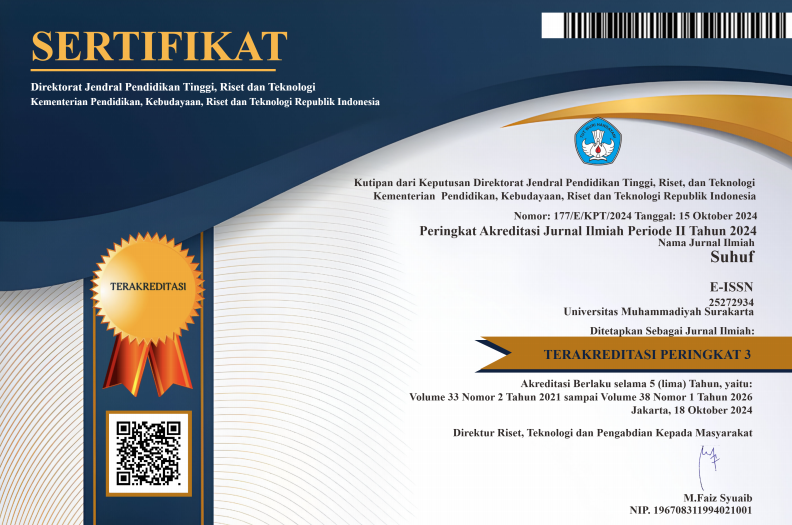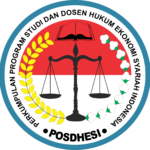Efforts to Save the Universe: Muhammadiyah's Concern for the Environment
DOI:
https://doi.org/10.23917/suhuf.v36i1.4422Keywords:
Efforts, Environment, Muhammadiyah, Save, UniverseAbstract
Muhammadiyah as a part of the civilization has a responsibility to spread the mercy. The organization that founded by KH Ahmad Dahlan is not carrying the theme "Efforts to Save the Universe" for its 111th anniversary in 2023 without reason. This is because the universe is not fine. Especially the natural environment. The proof is the waste emergency, the prolonged impact of El Niño, forest fires, and the never-ending haze. These are the problems of this research. Collective efforts as the solutions are needed to resolve these problems. Muhammadiyah as a preaching movement of amar ma'ruf nahi munkar takes a role in caring for the environment. This research has some contributions. They are as a lesson learnt for another communities and the implementation of Fikih Biah. The purpose of this article is to analyze the realization of efforts to save the universe. The method used is literature research. Some literatures are used to reveal the role of Muhammadiyah to reach the good society (khairu ummah). Water jurisprudence, disaster jurisprudence, Global Forum for Climate Change, and a lot of communities empowering are the evidences of Muhammadiyah commitment to save this universe. The conclusion of this research that include in Muhammadiyah efforts is felt in adding environmental awareness, switching consumption behavior, and developing the quality of life of local socities.
Downloads
References
S. Rahmah and R. I. Rosyadhi, “Unlocking HAMKA’s Insights on Inner Peace in Tafsir al-Azhar,” Suhuf Int. J. Islam. Stud., vol. 35, no. 2, pp. 39–49, 2023, doi: https://doi.org/10.23917/suhuf.v35i2.22965.
M. Murjazin, A. Nurhuda, L. Susanti, and Y. S. Azami, “Psychological and Physiological Motives in Humans (Study on Verses of The Qur’an),” Suhuf Int. J. Islam. Stud., vol. 35, no. 1, pp. 30–44, 2023, doi: https://doi.org/10.23917/suhuf.v35i1.22581.
The Central Board of Muhammadiyah, The Islamic View of Water Use and Conservation. Yogyakarta: The Central Board of Muhammadiyah, 2016.
T. Patrianti, N. N. Muksin, and D. Ziandhan, “Risk Communication on Disaster and Environmental Protection as Muhammadiyah Jihad of The Second Century,” J. Contemp. Islam. Commun. Media, vol. 2, no. 1, pp. 16–26, 2022, doi: https://doi.org/ 10.33102/jcicom.vol2no1.35.
A. Khoirunnisa, F. Rohman, H. A. Azizah, D. Ardianti, A. L. Maghfiroh, and A. M. Noor, “Islam in the Midst of AI (Artificial Intelligence) Struggles: Between Opportunities and Threats,” SUHUF, vol. 35, no. 1, pp. 45–52, 2023, doi: https://doi.org/10.23917/suhuf.v35i1.22365.
M. Manalu, “Inter-Religious Engagement Fight For Environmental Crisis: Eco-Bhinneka Muhammadiyah as a Facilitator of Religious Harmony through Environmental Care,” Reli. J. Stud. Agama-agama, vol. 19, no. 1, pp. 97–110, 2023, [Online]. Available: https://ejournal.uin-suka.ac.id/ushuluddin/Religi/article/view/4514
N. N. Khofifah, A. Bahrun, W. Oktriawan, and A. A. Muhammad, “The Effect of Religiosity and Disposable Income on Interest in Saving Purwakarta Community in Islamic Banks,” Suhuf Int. J. Islam. Stud., vol. 35, no. 2, pp. 1–10, 2023, doi: https://doi.org/10.23917/suhuf.v35i2.23030.
M. Ikhwanuddin, “Muhammadiyah’s Response to Climate Change and Environmental Issues: Based on Tarjih National Conference,” in 1st Borobudur International Symposium on Humanities, Economics and Social Sciences (BIS-HESS 2019), Atlantis Press, 2020, pp. 762–766. doi: https://doi.org/10.2991/assehr.k.200529.161.
Z. Baidhawy, “The Role of Faith-Based Organization in Coping with Disaster Management and Mitigation: Muhammadiyah’s Experience,” J. Indones. Islam, vol. 9, no. 2, pp. 167–194, 2015, doi: http://dx.doi.org/10.15642/JIIS.2015.9.2.167-194.
M. Ali, “The Muhammadiyah’s 47th Congress and ‘Islam Berkemajuan,’” Stud. Islam., vol. 22, no. 2, pp. 377–386, 2015, doi: http://dx.doi.org/10.15408/sdi.v22i2.1978.
L. Susanti, M. F. Al Khoiron, A. Nurhuda, and M. Al Fajri, “The Reality of Tarbiyah, Ta’lim, and Ta’dib in Islamic Education,” Suhuf Int. J. Islam. Stud., vol. 35, no. 2, pp. 11–19, 2023, doi: https://doi.org/10.23917/suhuf.v35i2.22964.
H. Setiawan, N. I. Kurniawan, and P. Santoso, “The Ecotheological Movement of the Muhammadiyah Environmental Council in Response to the Environmental Governance Crisis,” Millah J. Stud. Agama, vol. 21, no. 3, pp. 639–670, 2022, doi: https://doi.org/10.20885/millah.vol21.iss3.art2.
W. Jauhari and M. D. A. Khan, “Implementation of The Concept of’Urf and Maslahah in Buying and Selling Gold With Non-Cash Payment (Comparative Study of Fatwa DSN-MUI and Fatwa Al-Lajnah Ad Dāimah Li Al-Buhūṡ Al-‘Ilmiyyah Wa Al-Iftā’Saudi Arabia),” Suhuf Int. J. Islam. Stud., vol. 35, no. 1, pp. 54–65, 2023, doi: https://doi.org/10.23917/suhuf.v35i1.22638.
F. Wijsen and A. A. Anshori, “Eco-Theology in Indonesian Islam: Ideas on Stewardship Among Muhammadiyah Members,” J. Gov. Civ. Soc., vol. 7, no. 1, pp. 109–118, 2023, doi: http://dx.doi.org/10.31000/jgcs.v7i1.7303.
R. Husna, M. Maqfirah, and S. A. Alsounusi, “Interaction Between Religious People in the Qur’an: Examining Tolerance in Tafsir Bun Yanun Marshush,” SUHUF, vol. 35, no. 2, pp. 20–30, 2023, doi: https://doi.org/10.23917/suhuf.v35i2.23120.
N. Najiburrohman and S. Mariatin, “The Essence of Mahabah from the Perspective of Sheikh Abdul Qadir Jailani: A Study of The Tafsir of Al-Jilani,” Suhuf Int. J. Islam. Stud., vol. 35, no. 1, pp. 12–29, 2023, doi: https://doi.org/10.23917/suhuf.v35i1.22079.
A. Puspitasari and Q. Z. A. Murtadho, “Spinning Wheels of Knowledge: Elevating Arabic Language Learning Through Innovative Teaching Methods,” Suhuf Int. J. Islam. Stud., vol. 35, no. 2, pp. 50–58, 2023, doi: https://doi.org/10.23917/suhuf.v35i2.23074.
I. Safi’i and W. Tarmini, “The Impact of Al Islam and Muhammadiyah Development on Integrity, Obedience, and Involvement in Muhammadiyah Organizations,” SUHUF, vol. 35, no. 1, pp. 1–11, 2023, doi: https://doi.org/10.23917/suhuf.v35i1.21741.
A. Agustina and M. I. Anshory, “Activities of the Muhammadiyah Student Association (IPM) at SMK Muhammadiyah Karanganyar,” Suhuf Int. J. Islam. Stud., vol. 35, no. 1, pp. 53–65, 2023, doi: https://doi.org/10.23917/suhuf.v35i1.22616.
M. N. Zuhdi, I. Setiawan, D. S. Aditya, M. A. Nawawi, and R. Firmansyah, “Religion, Higher Education, and Environmental Sustainability: Identification of Green Fiqh in Islamic Religion Courses at Muhammadiyah and Aisyiyah Universities,” J. Iqra’ Kaji. Ilmu Pendidik., vol. 8, no. 2, pp. 443–460, 2023, doi: https://doi.org/10.25217/ji.v8i2.2984.
S. Jamil, “Halal Wastewater Recycling: Environmental Solution or Religious Complication?,” in Religious Environmental Activism, Routledge, 2022, pp. 93–111. doi: https://doi.org/10.4324/9781003017967-7.
R. K. D. Susilo and A. Arrozy, “Muhammadiyah Environmental Ethics to Realize Green Campus: Case Study at The University of Muhammadiyah Malang,” in International Conference on Politics, Social, and Humanities Sciences (2nd ICPSH 2022), 2023, pp. 496–508. doi: https://doi.org/10.18502/kss.v8i3.12851.
R. Desianti, D. Efendi, and A. Mahadika, “Civil Islam Movement is Responding to Environmental Degree Yogyakarta City (Study: Environmental Council For Muhammadiyah Regilonal Leadership in Yogyakarta,” J. Pendidik. Ilmu Pengetah. Sos., vol. 14, no. 1, pp. 82–95, 2022, [Online]. Available: https://garuda.kemdikbud.go.id/documents/detail/2856330
D. A. Karimah, M. B. Pamuncak, and M. K. Mubin, “The Role of Waqf in Supporting Sustainable Development Goals: Linking Theory and its Practices,” Suhuf Int. J. Islam. Stud., vol. 35, no. 2, pp. 31–38, 2022, doi: https://doi.org/10.23917/suhuf.v35i2.23018.
M. Abadi, I. Permadi, R. Prasetyo, and W. Simin, “The Ecotheological Movement Among The Muslim Youngers Generation in Indonesia: Case Studies Eco Deen and Green Cadre of Muhammadiyah,” Asian People J., vol. 5, no. 2, pp. 179–194, 2022, doi: https://doi.org/10.37231/apj.2022.5.2.473.

Downloads
Submitted
Accepted
Published
How to Cite
Issue
Section
License
Copyright (c) 2024 Shubhi Mahmashony Harimurti, Shahbaz Alam

This work is licensed under a Creative Commons Attribution 4.0 International License.


















